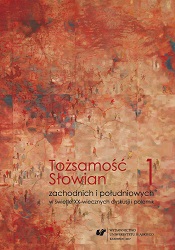Dijalektička perspektiva južnoslavenskih književno‑jezičnih odnosa
A dialectical perspective on South Slavic literary-linguistic relations
Author(s): Ana Dalmatin
Subject(s): Language and Literature Studies, Studies of Literature, Theory of Literature
Published by: Wydawnictwo Uniwersytetu Śląskiego
Keywords: language; dialectical trinity; ethnogenesis; Proto-Slavic; Shtokavian; Croatian Standard; a new perspective
Summary/Abstract: Linguistically speaking, man is different from all other living beings, and therefore the language at the time of expressiveness is the essence of being. The language as an institution is what created the individual human spirit, as well as the society in which theindividual exists as a zoon politikon. The history of South Slavic linguistic relations can be viewed from the standpoint of Hegel’s dialectical trinity: thesis – antithesis and synthesis. The thesis of the language as the image of the world is in connection with the form of life. Connecting the historical experience of the poetic vision is realized in the works of Croatian writers. The consciousness of the common ethnogenesis, Proto-Slavic and old Slavic paradigms, is present in Croatian literature from Gundulić and Palmotić to Ujević, Simić, Krleža. As a system, Shtokavian has multiple realizations. The Croatian standard, in its own identity and uniqueness, constitutes realization is one of them by accessing the language like a sociolinguistic category, a short history of Croatian-Serbian language relations, reference tothe history, and the present Croatian language refers to Wittgenstein’s thesis according towhich the reflective linguistic representation of the world is in fact reflective of the languageof facts. International acknowledgment Croatian language, from the perspective of Hegel’s dialectic, is the point at which alienated ideas in the spirit of self-consciousness of the people come back again to themselves. It does not represent the ending point. On the contrary, it is the opening of a new perspective on the Croatian language.
- Page Range: 221-232
- Page Count: 12
- Publication Year: 2017
- Language: Croatian
- Content File-PDF

